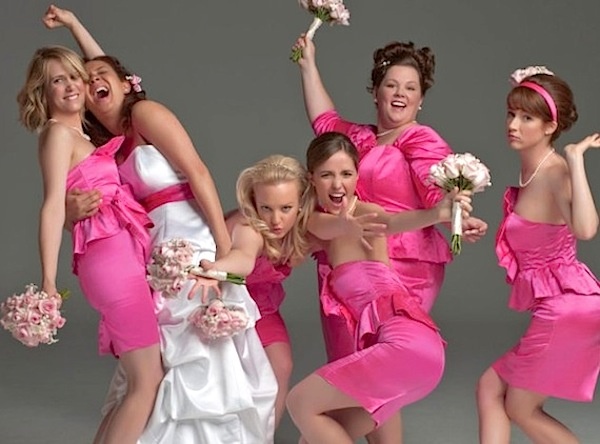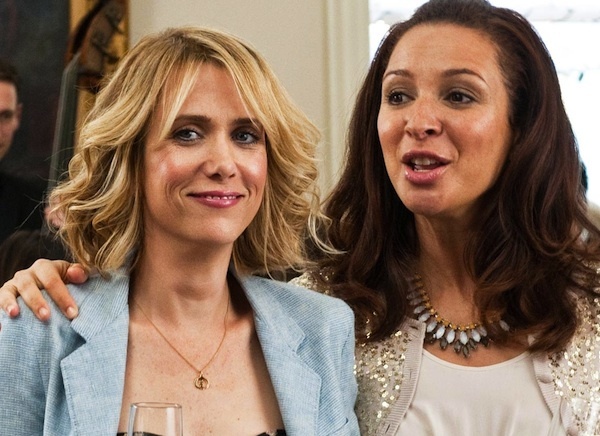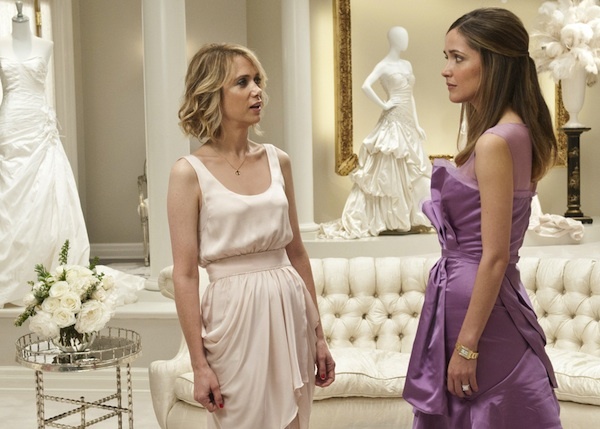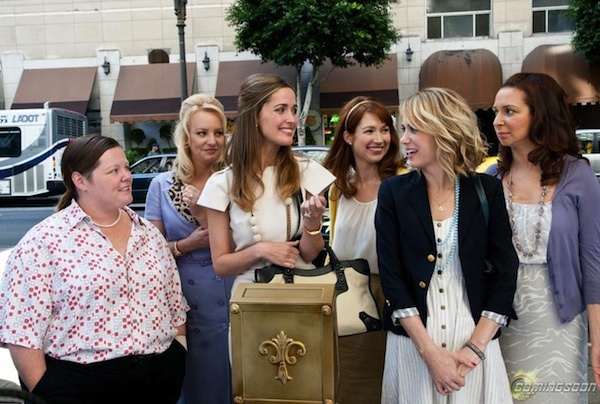Bridesmaids is the latest from the producers of “40 Year Old Virgin” and “Superbad”, with an interesting spin: female comedy with a male sense of humour. Does it work?...
Women are crazy.
At least that’s how the makers of “Bridesmaids” have portrayed them. They’ve taken an unflinching and often unflattering view of the fairer sex… to great effect. In a year where so many have failed to deliver (cough “The Hangover 2” cough), this one has come almost out of nowhere to stake its claim as funniest comedy of the year.
The movie’s core audience might be a bit shocked by how raunchy, crude and sometimes flat-out gross the humour can get. That’s more guy territory. Yet “Bridesmaids” is very much a chick-flick. I dare say this is the most sincere and truthful chick-flick in quite a while. It genuinely “gets” women and the dynamics of female friendships. While the characters and situations are mostly played for laughs, don’t be surprised if you find yourself identifying with them.
The heroine of this story hardly qualifies as one. Annie (Kristen Wiig) is not even spirited enough to be an anti-heroine. She’s just sort of an inert figure, letting life, love and career pass her by. Her cakeshop business went bankrupt, and she’s in a dead-end relationship with a callous bastard (Jon Hamm, the foremost expert on playing callous bastards). When her best friend Lillian (Maya Rudolph) announces she’s getting hitched, it finally nudges Annie into motion. Unfortunately, that direction is downwards. The film reminds us that while women have become liberated in so many ways, they are still hamstrung by traditional thinking when it comes to domestic life. Apparently, if you’re not married by a certain age, you’re considered a failure.
Lillian’s milestone hangs heavily around Annie’s neck, weighing her down with a mixture of insecurity, envy, and self-loathing. Although she loves her best friend dearly, she resents the fact that she’s being left behind as the sole member of the singleton’s club. As the maid-of-honour, Annie has no choice but to face things head-on. To make things worse, one of the bridesmaids is everything that Annie is not. Helen (Rose Byrne) is glamourous, successful, popular, and married to a filthy rich man.
Any woman who’s ever gotten married or been part of the wedding plans can tell you what a stressful time it is. It can bring out the worse in women, and the film takes great pleasure in laying the ugliness bare. Annie and Helen become increasingly competitive, best demonstrated in a hilarious scene where they keep trying to top one another during an engagement party toast. What starts out as a simple message of love escalates into verbal contest to impress the bridal couple and assembled guests, culminating in a full-blown (and very tone-deaf) rendition of “That’s What Friends Are For”. Unlike males, rivalry between females is usually more subtle, and the movie dials that up nicely. No need for slapstick hair-pulling when mind games and emotional manipulation are so much more effective. The only time it gets physical is in a not-so friendly tennis match. I lost count of the number of times both gals got whacked in the boobs.
Despite her potentially annoying Little Miss Perfect persona, Helen is never written or portrayed as an evil bitch. Which is something I appreciate. Making her the villain would be too contrived, too convenient. A story like this doesn’t need one, since each woman is her own worst enemy. Besides, it’s far more interesting, not to mention realistic, to render these characters in shades of grey. Or else they’d just be caricatures. Rose Byrne does a good job of making Helen the kind of woman you feel bad for hating, but can’t help hating anyway. Byrne plays it vague, so you’re not exactly sure where she’s coming from. Although her take-charge attitude is a little obnoxious, you can also tell she means well. You rarely find this kind of balanced characterisation in a big, broad Hollywood comedy. Especially nowadays.
The real star of the show here is Kristen Wiig. Annie is a very flawed, complex character, who at some points veers dangerously close to being unlikable. She’s erratic, she runs away from those who love her, and there’s a scene late in the film where she goes into a complete emotional meltdown. It’s a testament to Wiig’s acting ability that she manages to turn it around and actually make Annie feel sympathetic. This is definitely one of the year’s more memorable performances. Wiig, a regular on comedy TV show “Saturday Night Live”, also co-wrote the script, so I wouldn’t be surprised if there’s a lot of herself in this character. Annie certainly feels like a real, fully fleshed-out person. Producer Judd Apatow, who directed crowd pleasers “40 Year Old Virgin” and “Superbad”, clearly exerted some influence here as well.
I also like Annie’s friendship with Lillian. There’s the sense of an unspoken history between these two, with all the usual ups and downs of a BFF relationship. Maya Rudolph is a warm, soulful presence and makes a nice counterpoint to Wiig’s more edgy nature. And for all the craziness on display, “Bridesmaids” is not a mean-spirited film. It has a lot of heart. Besides the chemistry between the leads, the supporting cast works really well too. The standout among them is Melissa McCarthy as the loud-mouthed, thick-skinned Megan. She earns the lion’s share of the laughs with her distinctly un-ladylike behavior. McCarthy is the female equivalent of Zach Galifianakis from “The Hangover”. But rounder. And more depraved.
Like its protagonists however, “Bridesmaids” is far from perfect. Certain scenes drag on longer than they should, risking audience fatigue. The film’s tone lurches wildly between sober and rowdy. Director Paul Feig is either unable or unwilling to give the film a consistent voice. It seems like he’s trying to combine female politics with the male-minded R-rated comedies that have been doing so well at the Box Office. And underneath all that, a touching, sensitive look at female desperation. I’ll give Feig and his co-writers Wiig and Annie Mumolo enough credit that while this mish-mash doesn’t always work, it does give the film a refreshing identity all its own.
The filmmakers never lose sight of the fact that “Bridesmaids” is ultimately a feel-good film. It does stick to formula in some areas, particularly Annie’s romance with a cop (Chris O’Dowd). In a chick-flick, there’s only one way their story can end, and you already know what that is. Sometimes, sticking to formula is the right thing to do. The audience wants to be rewarded. And this ending is one heck of a reward. It’s got reconciliation, tears of joy, fireworks, puppies in bowties, and a cameo appearance by a 90s pop group. It’ll put a big, happy smile on your face. It sure did for me.
I am fairly certain that in time, “Bridesmaids” will be looked upon as a genre classic. It’s one of those rare anomalies that succeeds in entertaining both women AND men. Instead of the typical rose-tinted fantasy depiction of women, the creative team has gone for a warts & all portrayal.
It’s true: women can be crazy, unpredictable, disgusting… and very, very funny.
For more movie reviews check this out.





Excellent movie. If you want to watch this movie then install terrarium tv app on your device.
Awesome movie. One of the better ones out there. And it's so rare to find a movie about women and the relationships between women.
“Good girls go to heaven. Bad girls have all the fun.”